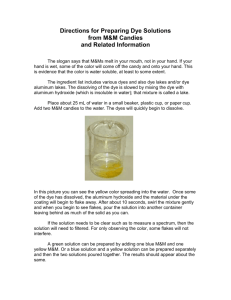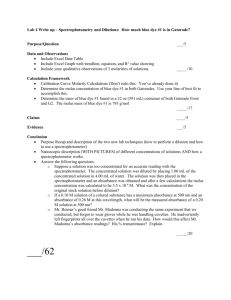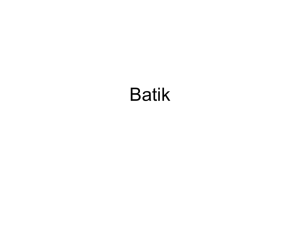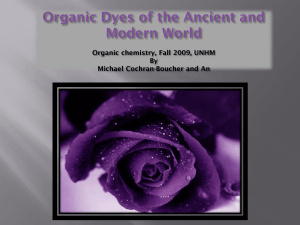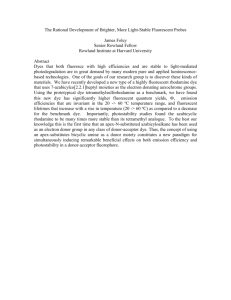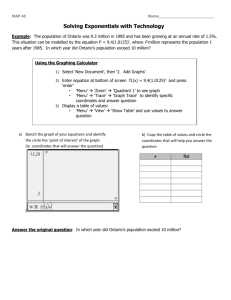Red Acid Dye Effects of Microbial Life
advertisement
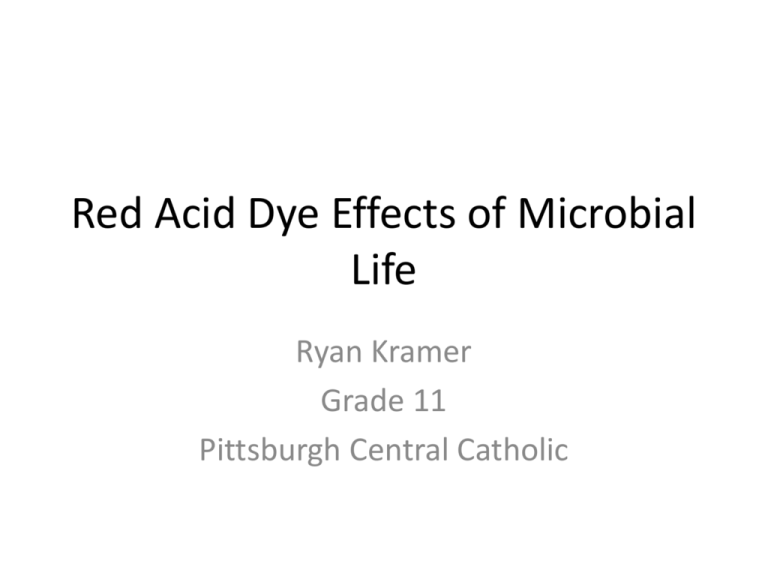
Red Acid Dye Effects of Microbial Life Ryan Kramer Grade 11 Pittsburgh Central Catholic Problem • Water systems are polluted with: • • • • • • • • • Antibiotics Pharmaceuticals (Estrogen, etc.) Mercury Sulfur Sewage Fertilizers Organics Cleaning projects Dyes and other colored agents Dye Effects on Water • Studies have shown that dyes add unwanted colors and toxins to water that effect microbial life and algal photosynthetic rates. Euglena Gracilis • Unicellular organism from the Protista Kingdom. • Both autotrophic and heterotrophic. • Found in fresh and salt water. • Reproduce rapidly. • Absorbs light readily. Acid Dye • Used by companies to color clothing, textiles, ect. • Researchers claim they’re non toxic and have no harmful effect on aquatic life. • Billions of gallons dumped changed photosynthetic rates and alter PH harming aquatic life. • Modern chemistry still can’t prevent all dye problems • Sudan I crisis in the UK when a carcinogenic dye got in over 400 super market items. Food Coloring • Studies have shown colors affect taste • For this reason companies add colors to enhance dining experience • It is a non-toxic dye. • Chosen because • Its non-toxic • Easy to obtain • Will test if color alone will effect algal growth Spectrophotometer • Device measuring light intensity or wavelengths of light • Used for measuring light absorption • Measures the light absorption of the algae • More absorption means more algae • Wavelength: 430nm Purpose • To determine if dyes have an effect on the growth of the Euglena Gracilis. Hypothesis • Null Hypotheses: Adding color will not have a significant effect on algal growth. • Alternative Hypotheses: Adding color will have a significant effect on algal growth. Materials • Science Kit Educator Spectrophotometer • 80 13x100 mm borosilicate culture test tubes • Red food coloring • Micropipette • Test tube rack • Pipette tips • • • • • • Red Acid Dye Euglena Gracilis Microscope Hemocytometer Spring Water Soil Water Procedure • Stock solutions of food coloring and dye were generated. Spring H2O Soil H2O Euglena AD/FC 0% 2mL 1mL 2mL 0mL 1% 1.90mL 1mL 2mL 10uM 5% 1.50mL 1mL 2mL 50uM Procedure • The spectrophotometer was blanked and absorbance readings were taken. • Absorbance readings for each tube were taken at 430 nm every day for two weeks. • After two weeks a cell count was taken with a hemocytometer at 100 times magnification to check if the cells were alive after 2 weeks. Euglena Absorbance 1.6 1.55 P Value: 6.064x10E-29 Abs. at 430 nm 1.5 1.45 Control 1% FC 1.4 5% FC 1.35 1% AD 5% AD 1.3 1.25 1.2 Day 1 Day 2 Day 3 Day 4 Day 5 Day 6 Day 7 Day 8 Day 9 Day 10 Day 11 Day 12 Day 13 Day 14 Extent of Time Dunnett’s Test T Crit: 3.48 Variable Group T Value Interpretation 1 % FC 3.51 Significant 5 % FC 5.43 Significant 1% AD 5.51 Significant 5% AD 10.63 Significant Euglena Cell Counts After 14 Days 45000 40000 P Value: 4.43E-12 Number of Cells 35000 30000 25000 20000 15000 10000 5000 0 Control 1% FC 5% FC Variable Group 1% AD 5% AD Dunnett’s Test T Crit: 3.48 Variable Group T Value Interpretation 1 % FC 3.57 Significant 5 % FC 5.289 Significant 1% AD 6.289 Significant 5% AD 11.889 Significant Conclusion • The null hypothesis was rejected for all four groups in the absorbance and cell count tests. • This means that the algae survivorship was significantly effected by the red colored dyes. • The most likely explanation for the decline in algal growth was the added color effected photosynthetic rates. Limits and Extension • Limits • The test tubes may have receive differing amounts of sun light which could change photosynthesis. • Only one type of algae was used in this experiment. • Extensions • Test more colors of dye. • Introduce a compound to break down the dye to see if dye break down affect the algal growth. References • K.Suthagar. POLLUTION_CONTROL_IN_DYE_INDUSTRY-_2204-09. National Centre for Catalysis Research. PPT. • "Water Pollution." MBGnet. Web. 05 Nov. 2011. <http://www.mbgnet.net/fresh/pollute.htm>. • "BBC NEWS | Health | Food Recalled in Cancer Dye Scare." BBC News - Home. Web. 05 Nov. 2011. <http://news.bbc.co.uk/2/hi/health/4277677.stm>. • "Acid Dye." Wikipedia, the Free Encyclopedia. Web. 05 Nov. 2011. <http://en.wikipedia.org/wiki/Acid_dye>. • "Food Coloring." Wikipedia, the Free Encyclopedia. Web. 06 Nov. 2011. <http://en.wikipedia.org/wiki/Food_coloring>. • http://www.emc.maricopa.edu/faculty/farabee/biobk/biob ookps.html
